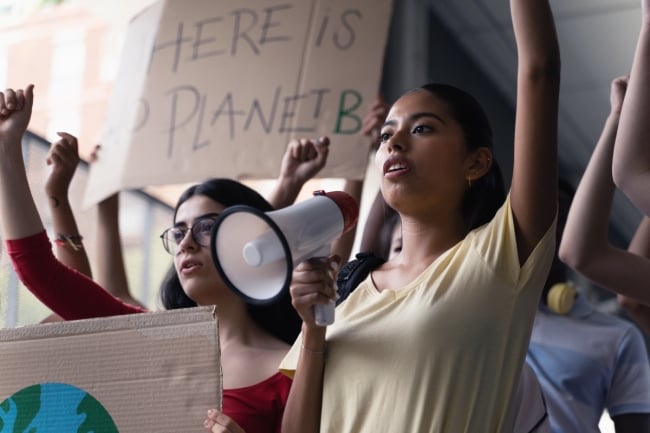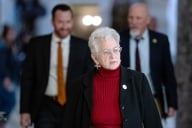You have /5 articles left.
Sign up for a free account or log in.

A majority of students believe free speech rights are critical to American democracy.
iStock/Getty Images Plus
While most college students believe that freedom of speech is a cornerstone of American democracy, a new report released Tuesday shows that a shrinking share sees freedom of speech as secure. A growing majority also believe their college or university stifles free expression.
According to the report from the Knight Foundation, which surveyed 1,000 students between 18 and 24 enrolled in any kind of higher education institution last year, 84 percent said free speech rights are critical to American democracy. Yet only 47 percent said that their freedom of speech rights are secure, a share that has declined steadily since 2016, when 73 percent said they were secure.
Additionally, 65 percent of students believe their institution’s climate stifles free expression, preventing people from saying what they believe because others might find it offensive. That’s up from 54 percent in 2016.
Adam Goldstein, senior research counsel for the Foundation for Individual Rights in Education, said that over the past five years, students have begun advocating to restrain speech on campus, a departure from the historical trend of administrators trying to stifle student speech.
“Students are increasingly afraid of each other,” Goldstein said. “They’re afraid that they’ll be targeted for the things they say, and that makes them more reluctant to say things in the first place.”
The survey’s partisan divide was especially pronounced. Among students who identified as Republican, who made up 21 percent of total respondents, only 27 percent view their freedom of speech as secure; by contrast, 61 percent of Democrats and 46 percent of independents considered their freedom of speech secure.
Evette Alexander, director of learning and impact at the Knight Foundation, said the free speech environment on campus has changed since the foundation started conducting surveys on the subject. Everything from the Trump administration to the pandemic to the Black Lives Matter movement has heightened the politicization of speech on campus, she said.
“I think we do see more Republican students seeing free speech under threat right now,” Alexander said. “We also have concerning findings related to race and speech. Black students, for example, do not feel as protected by the First Amendment. So there are reasons, for equity and equality in society, that people don’t think this speech is secure.”
Only 51 percent of Black students, who made up 11 percent of respondents, said the First Amendment protected them, compared to 90 percent of white students (who made up 56 percent of respondents) and 82 percent of Hispanic students (22 percent of respondents).
Alexander said the Knight Foundation has known for a while that Black students are more interested in limiting certain types of speech on campus to create a more optimal learning environment. She’s concerned that so many Black students feel unprotected by the First Amendment when institutions are trying to promote both free speech and inclusivity.
“It is a big problem for all Americans, but definitely for people in the education field,” Alexander said. “Because if students don’t feel protected by the First Amendment and don’t feel that their speech is as equally protected as others’, then there’s consequences.”
Goldstein said FIRE’s research has shown that a lot of students, especially those from marginalized communities, feel their speech is restrained when they see another student being allowed to express themselves.
“You’ll see students say things like, ‘When I saw that they allowed this person with opposing viewpoints to speak, I knew that they would never let me speak,’” Goldstein said. “I think that’s especially true if you feel you’re in a marginalized community and you see there’s people who are speaking in ways that make you feel unsafe—you’re much less likely to want to volunteer to be the target of that hostile speech.”
He added that some students think if their institution tolerates ideas and speech they hate, then it doesn’t support their free speech.
However, a majority of students—59 percent—believe it is more important for colleges to expose students to all types of speech, even if they may find it offensive or biased. Twenty-two percent said institutions should protect students by prohibiting offensive speech, and 17 percent said they had no opinion.
Half of students said they personally feel comfortable expressing disagreement with their class instructor or other students in the classroom.
About one in five students reported feeling unsafe on campus, and 34 percent reported feeling uncomfortable due to a comment someone made in reference to their race, ethnicity, religion, gender or sexual orientation. Democrats and students of color were more likely to report feeling unsafe on campus, the report found.
Sixty percent of students said they favored institutions providing safe spaces—areas on campus designed to be free from threatening actions, ideas or conversations. Only 33 percent of students supported mandated speech codes, compared to 2017, when 49 percent of them did.
Goldstein said he’s seen a decline in institutions establishing speech codes on campus but no decline in the creation of safe spaces. However, he noted that safe spaces are returning to their original intended use, meaning there’s a small number of places on campus where students are free to speak without fear of consequence or discipline.
“I think safe spaces became troubling when people would declare an entire campus a safe space,” Goldstein said. “Especially because the core concept of a safe space was you’re free to be who you are without fear of judgment; then the way they were being implemented was incredibly judgmental and made students incredibly afraid.”
The report states that students generally support colleges restricting use of racial slurs but are less supportive of restrictions on political speech. Sixty-seven percent of students favor colleges restricting people from using racial slurs to refer to people of color, which dropped from 88 percent in 2019.
In terms of free expression, 45 percent said students should be restricted from displaying a pornographic poster in a dorm room, 34 percent said they shouldn’t be allowed to wear clothing displaying the Confederate flag and 21 percent said students should be prevented from starting a campus group to defend Americans’ gun ownership rights.
Sixty-six percent of students said they consider diversity and inclusion in conflict with free speech rights—a decline from 76 percent in 2019.
And 25 percent of students support disinviting speakers on campus because some students might perceive their message as offensive or biased, compared to 42 percent in 2019. Goldstein said some students might feel more compelled to confront controversial speakers and potentially challenge the speaker about differing opinions.
“I’d like to believe that students are kind of getting sick of this game of ‘We’re going to try to stop someone from speaking,’” Goldstein said. “I think that after students have seen people get silenced on all sides of the debate, eventually, students are kind of just exhausted with it, and you just want to hear people.”
The Knight Foundation also surveyed 4,000 American adults to compare college students’ views on free speech to those of the general public. Alexander said the foundation didn’t see a lot of difference.
“We are seeing that college student speech landscape as a microcosm of what’s happening in the United States at large,” Alexander said. “So that was very interesting to us that we didn’t see a ton of differences between students and the rest of the public.”








